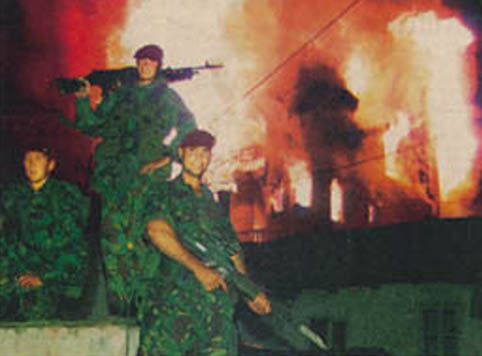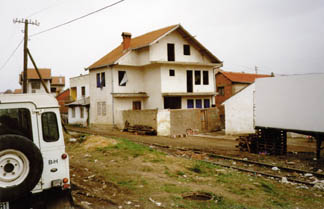| The pogrom against
all non-Albanian minorities had been carefully planned by the UCK (KLA)
a long time in advance. When it started, it soon turned into an orgy for
Kosovo Albanian plunderers as well as for Albanians who had come from Tirana.
They, for instance, plundered the Jewish homes in Pristina. Before the houses
were set on fire by the mob, they were stripped completely. The Catholic
Shalom Deacon Nikolaus von Holtey tells how in Vucitrin, Albanians who had
come with trucks as well as horse and cart, had taken everything from the
Roma homes: furniture, stoves, refrigerators, washing machines, tv-sets,
VCRs. Then everything else that could be used was taken out: floors, windows,
doors including frames, fittings, electric cables, etc.; all livestock was
stolen as well. Especially sought after were the belongings of migrant workers.
Their expensive cars were immediately seized by the UCK (KLA) prominents.
NGO activists agree upon the fact that Kfor soldiers were often unable or
unwilling to save the lives and the property of the minorities. In one incident,
Kfor was called by the ERRC commission (Soros foundation Budapest) to rescue
a Rom who had been severely injured by UCK (KLA) fighters. The Kfor people
only stepped in after ERRC members had consented to lead the way in order
to distract the attention of snipers. A heavily armed soldier said: "I am
not going to risk my life for you. You can understand that, can´t you?"
The American journalist Paul Polansky said about Kfor in his eyewitness
account, "They withdrew their troops from problematic areas. In their sectors,
the Roma were exposed to the UCK (KLA) like target dolls at a fair." The
French Kfor officer Huet stated that other NATO divisions had not intervened
in the killing, "because this made peace-keeping easier" (New York Times,
24 June 1999). In the largest of the UNHCR refugee camps near Pristina,
UN police refused to drive Roma children, who were very ill, to the hospital
in December 1999. Four children died. Houses were burned to the ground before
Kfor´s very eyes. (A Kfor-soldier: |
 Roma home on fire. Comment of the Kölner Stadtanzeiger,
28 June 1999: "These British soldiers are
Roma home on fire. Comment of the Kölner Stadtanzeiger,
28 June 1999: "These British soldiers are
obviously not aware of the seriousness of the situation as they are posing
in front of a burning Roma
house." Photo: rtr |
| "We are here to protect lives, not buildings.")
The ruins were then flattened and powerful Albanians were allowed to build
homes on the stolen ground, often with building material that was donated
by international relief organisations. But do we want to point at failings
of individual soldiers? Is it not a NATO decision to withhold military and
economic sanctions against |
the UCK (KLA) and to not prosecute the leaders
who are responsible for the pogrom, even though we proclaimed that this
so-called humanitarian war was started with the sole purpose of making such
a pogrom impossible? The destruction of the minorities in Kosovo - is that
the price that was paid to establish a NATO base in Kosovo and for the alliance
with the UCK (KLA)? |

